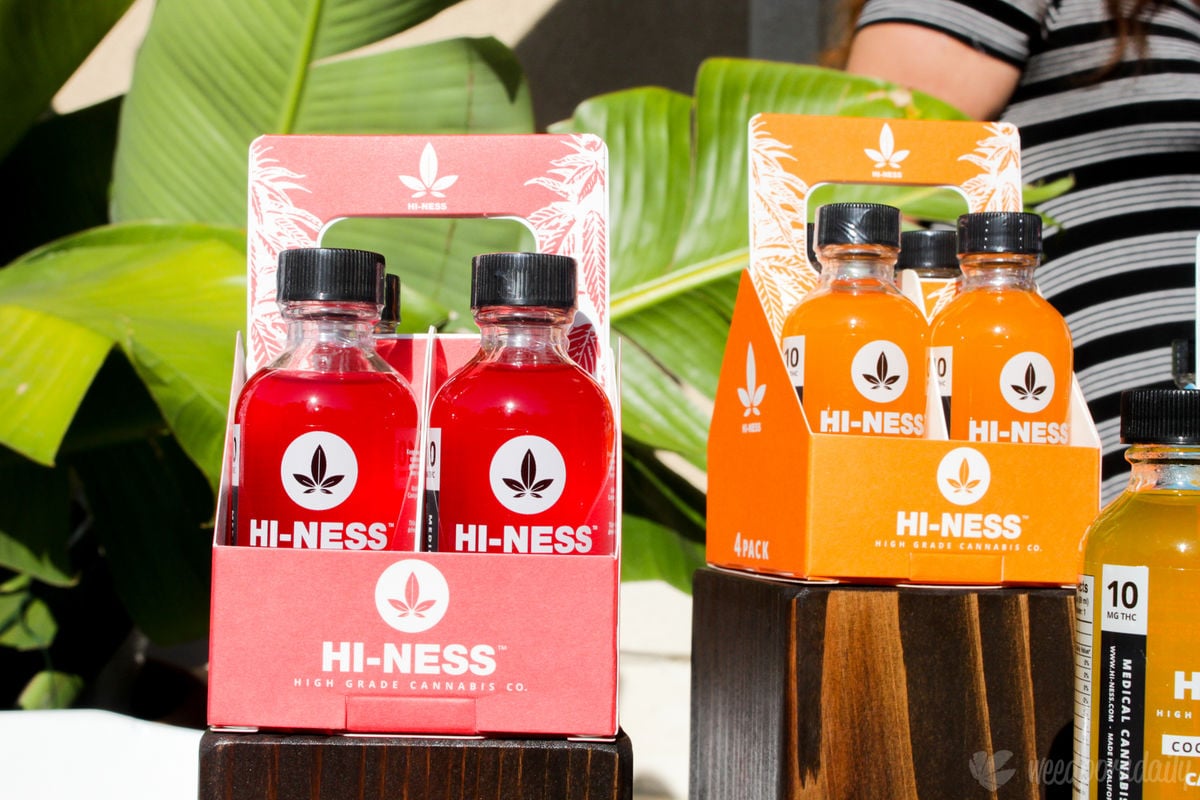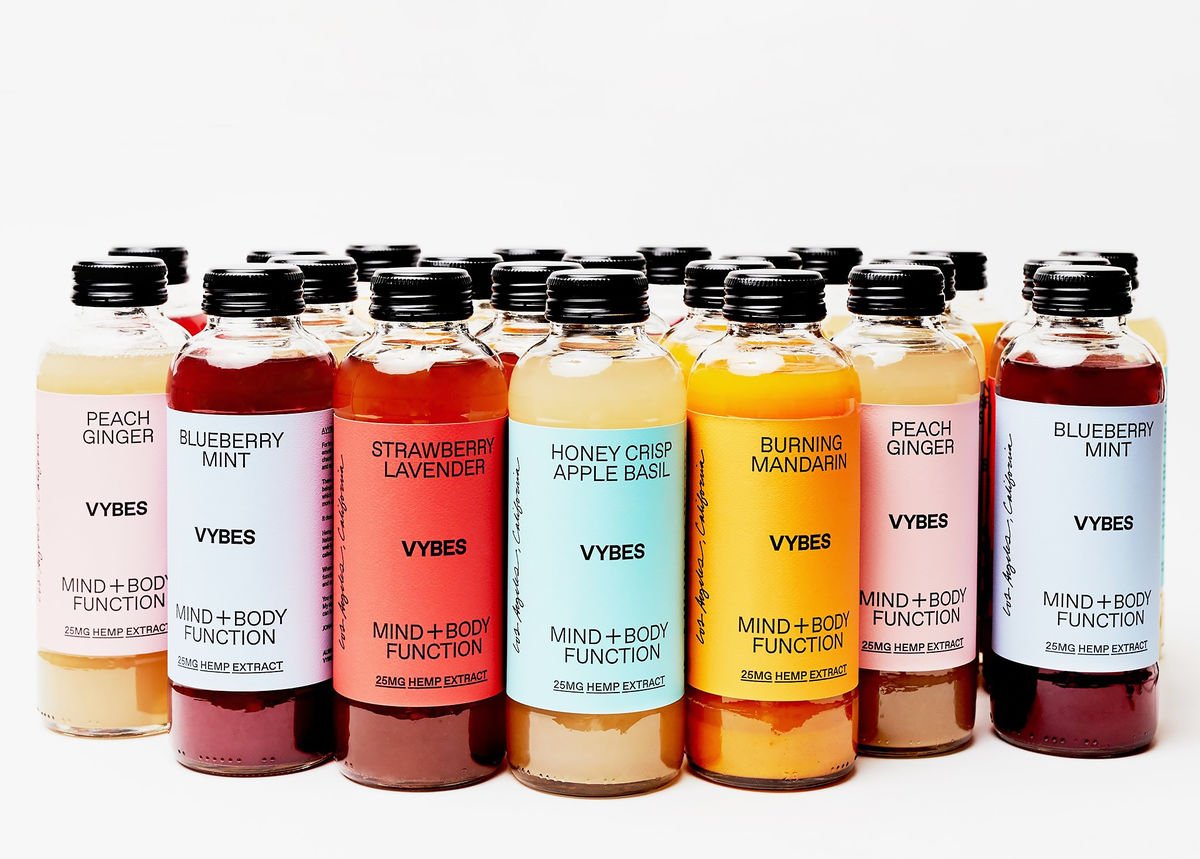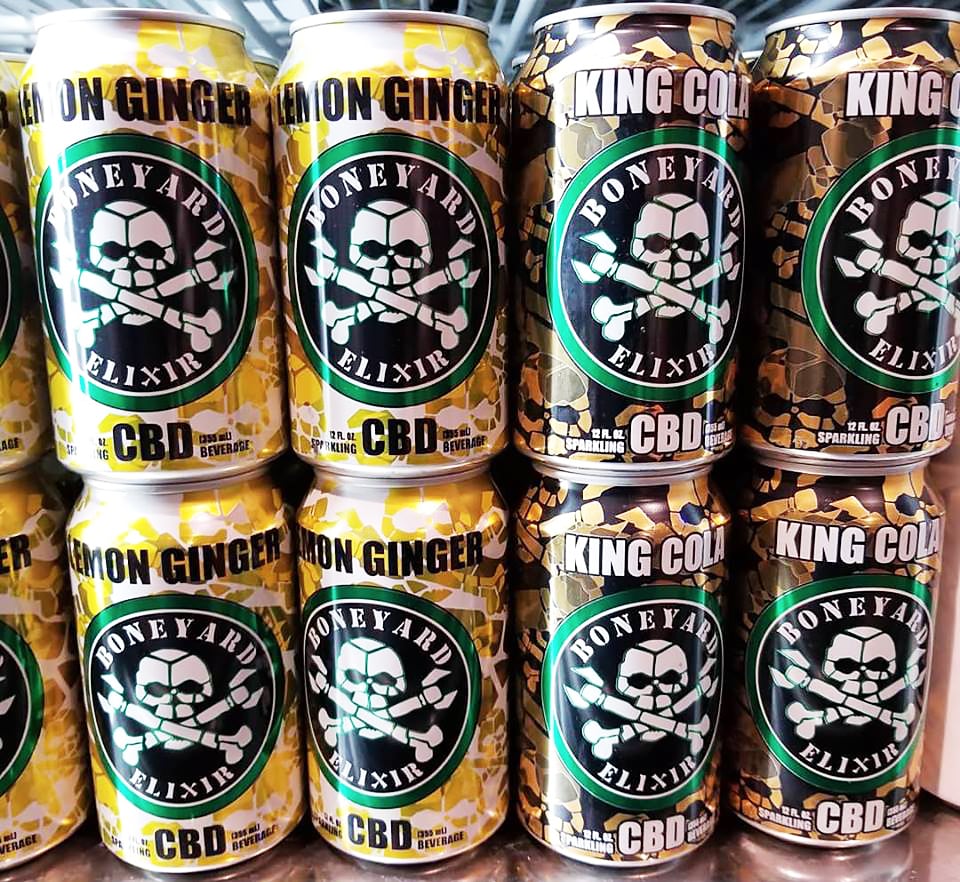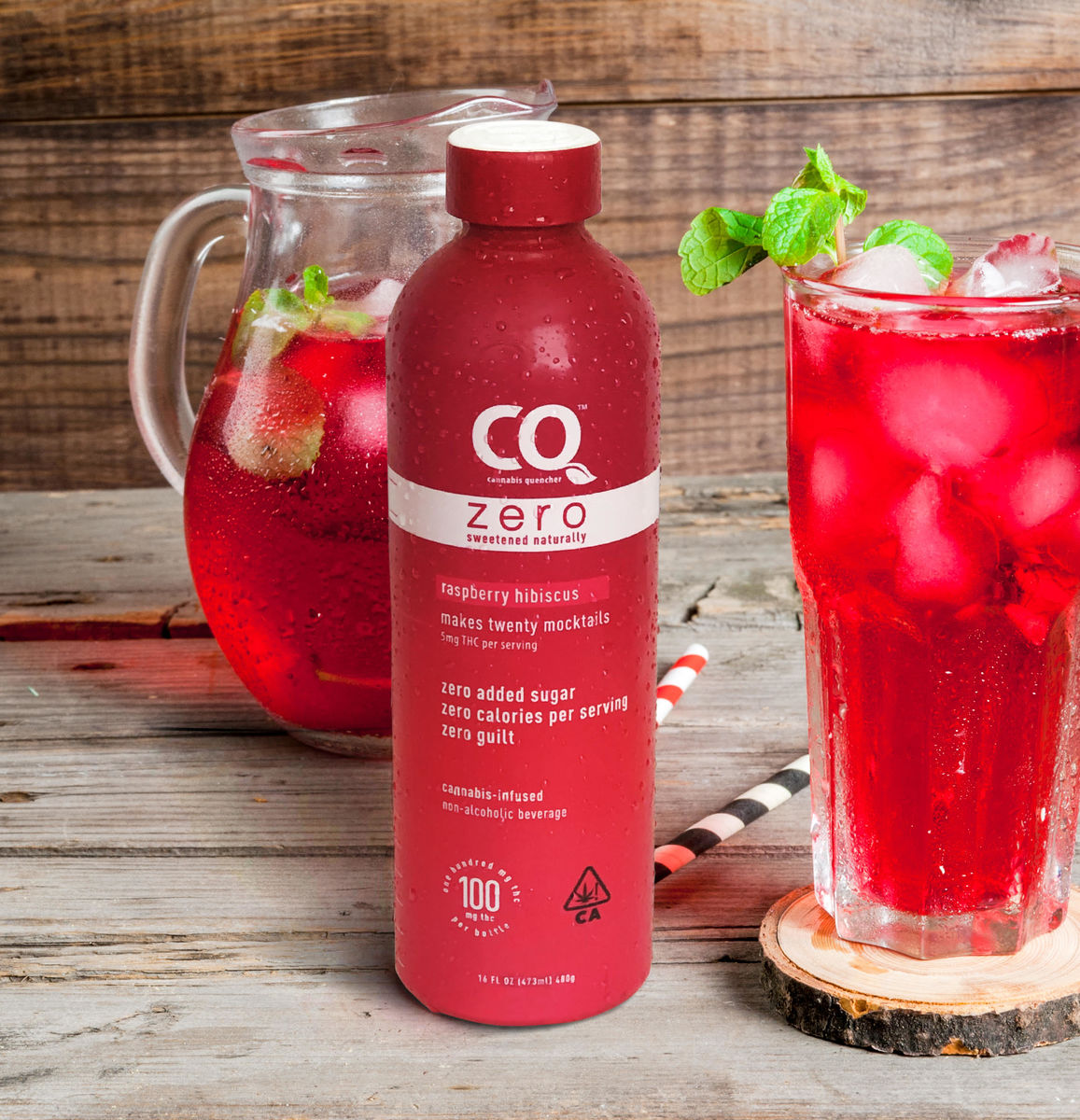Start 14-Day Trial Subscription
*No credit card required

Cannabis in Beverages: A Definitive Guide
Across the U.S., cannabis, marijuana and hemp drinks are flooding the market, with producers advertising the beverages as healthier, lighter alternatives to beer, wine and spirits. The drinks include still and sparkling waters, teas, fruit-flavored products and dealcoholized, tetrahyrocannabinol (THC)-infused drinks inspired by wines and beers. Cannabis drinks can usually be found in dispensaries and pop-up events where legal. Hemp drinks are starting to make their appearance in health stores and cafes as well.
Most cannabis, marijuana and hemp beverages come premade and ready-to-drink. Beverages with high amounts of THC, such as 100 mg, are designed to be poured into smaller doses. As more consumers explore the effects of THC and cannabidiol (CBD), producers will develop new drinks, especially ones with higher concentrations of these active ingredients.
THC and CBD: Similarities and Differences
Cannabis beverages are typically marketed as mildly intoxicating drinks that serve as a “social lubricant,” much like alcohol. Many cannabis drinks contain between 2.5 and 10 mg of THC. They may also contain cannabis-derived CBD as well. Hemp beverages are typically marketed as health and wellness products, designed to aid sleep and reduce pain and anxiety. Hemp beverages are non-intoxicating and may contain between 3 mg and 50 mg of hemp-derived CBD.
The majority of cannabis and hemp beverages do not have a strong “green” taste. Manufacturers tend to use processes to extract THC and CBD that eliminate the taste and odor of the plant.
The effects of THC and CBD differ according to the user and their tolerance. Generally, THC induces euphoria and a lively, excited feeling. THC can also reduce pain. The negative effects of THC can include anxiety, paranoia and stress. CBD, whether it is cannabis-derived or hemp-derived, and in the form of gummies, CBD oil tincture, or others, typically acts as a relaxant and pain reducer. When THC and CBD are combined, a user can experience a higher degree of relaxation and an upswing in mood. In addition, combining THC and CBD heightens the effect of pain reduction. A consumer who uses THC or CBD frequently and in heavy doses can build up a high tolerance to these compounds.

Understanding Cannabis, Hemp and Legality
Cannabis, a genus of flowering plant, contains three species, Cannabis sativa, Cannabis indica, and Cannabis ruderalis. The term “cannabis” refers to varieties of the plant that contain over 0.3 percent of the psychoactive compound THC. THC produces psychotropic and euphoric effects. Cannabis strains can contain up to 30 percent THC. The cannabis plant has been used as an intoxicant for over 10,000 years. “Hemp” is a non-scientific term that refers to a cannabis plant that contains 0.3 percent or less of THC by dry weight. Hemp was primarily bred for industrial use, such as textiles.
Hemp and cannabis can contain high levels of CBD, a non-psychoactive compound. Cannabis-derived CBD and hemp-derived CBD have the same effect. Yet only hemp-derived CBD is legal under federal law.
Cannabis was used in the U.S. for many years, but started being regulated in the 1920s. State governments led the charge to pass anti-cannabis laws, culminating with an 11-state ban by 1927. By the mid-1930s, every state had regulated cannabis. The federal government passed the Marihuana Tax Law of 1937 to heavily tax the possession, sale and transportation of cannabis. This legislation paved the way for cannabis prohibition.
The federal government declared cannabis illegal in the Controlled Substances Act of 1970. Today, cannabis remains illegal on a federal level. It is classified as a Schedule I substance, a drug that has been determined to have a high potential for abuse and no accepted medical use.
The federal government also declared hemp an illegal substance through the Controlled Substances Act of 1970. It reversed its decision in 2018. The passage of the Agricultural Improvement Act of 2018 legalized hemp and hemp-derived products, including hemp-derived CBD.
Eleven states have passed laws to allow the recreational use of cannabis, Alaska, California, Colorado, Illinois, Maine, Massachusetts, Michigan, Nevada, Oregon, Vermont, and Washington. The District of Columbia, the Northern Mariana Islands, and Guam also allow recreational use of the drug. Thirty-three states, the District of Columbia, Guam, Puerto Rico, and the U.S. Virgin Islands allow medical use of cannabis with a doctor’s recommendation. Fourteen other states have laws that limit the THC content of products. This allows consumers access to products that contain CBD. Other jurisdictions have decriminalized the use of cannabis.
Currently, the U.S. is a patchwork of different laws regarding cannabis and hemp. In some states, like California and Colorado, a consumer can find a multitude of premade cannabis and hemp beverages. Yet state laws, like California Assembly Bill 2914, prohibit certain actions, such as the addition of CBD to an alcoholic cocktail at a public establishment like a restaurant.
In other states, such as in most of the South, cannabis and hemp beverage production is lagging. This is because a number of states have not legalized cannabis for recreational use. It is also because state laws may prohibit transport of a cannabis product across state lines. This means a manufacturer has to establish a manufacturing facility in every state where they will sell the product. Another obstacle is the fact that federal and sometimes state laws prohibit mixing alcohol and either THC or CBD.
The U.S. Food and Drug Administration (FDA) is currently considering the safety and quality of products containing cannabis and cannabis compounds. In May 2019, the U.S. Food and Drug Administration (FDA) held its first public hearing to obtain scientific data and information on the effects of cannabis compounds.
Cannabis can also be cultivated in your backyard, though once again check the legality of the plant in your area. All you need is a cannabis strain, and make sure to get the cannabis seeds from marijuana seed banks only!

Exploring Cannabis and Hemp Beverages
Breweries have made huge strides in creating dealcoholized beers that they infuse with THC.
Two Roots Brewing, a San Diego brewery, is making Southern California craft beer in five different styles, a lager, a stout, New West IPA, Blonde ale, and a Wheat ale, each with 5 mg THC. The company has two more releases planned for this year.
“Consumers are searching for and have availability of healthier consumption options in traditional markets. They lack [those options] in non-traditional markets. Two Roots is a product that bridges consumers’ desire for healthier consumption options within the cannabis market. We’ve made a drink that tastes like beer without the drawbacks of alcohol,” said Kevin Love, vice president of market activations for Cannabiniers. The company has acquired three other U.S. craft breweries to create THC-infused beverages.
Love said the infusion technology involves adding water-soluble, flavorless THC to the beverage.
“Our “cannabiers” have a rapid onset, where you feel the THC take effect in 10 minutes,” said Love.
Ceria Brewing Company, an Arvada, Colorado-based brewer, also released a dealcoholized version of beer with a water-soluble THC infusion. Keith Villa, the creator of Witbier Blue Moon, said the first offering is Grainwave, a dealcoholized Belgian-style white ale with 5 mg of THC.
“We expect to release a dealcoholized IPA with 10 mg of THC and 10 mg of CBD this summer and a light lager craft style beer with 2.5 mg THC by the end of 2019,” said Villa.
Villa said Ceria is focusing on making low-dose products “socially acceptable, for birthday parties, gatherings, anywhere you’d have fun.”
A number of manufacturers have focused on drinks that taste more like cocktails.
Jared Yeck, previous operations manager of Boneyard Beer in Bend, Oregon, is now the head of Boneyard Elixir. The new company creates hemp-derived CBD-infused wellness beverages.
“We’ve created three varieties, Lemon Ginger, King Cola Elixir and Passionfruit Orange Turmeric Elixir. The Lemon Ginger is lemon forward, with some ginger heat to back it up. The Passionfruit Orange Turmeric is fruity but very earthy. Each can contains 25 mg of hemp-derived CBD,” said Yeck.
Yeck said the Boneyard Elixirs help consumers relax and cope with chronic pain.
Kenny Morrison, CEO of the Los Angeles-based VCC Brands, said his beverage, Cannabis Quencher™, is designed to be drunk in small doses.
Cannabis Quencher™ is a still, fruit-flavored drink that comes in a variety of flavors and potencies. Examples include Wildberry Guava and Strawberry Lemonade, each with 100 mg THC, as well as CBD Hibiscus, with 100 mg CBD and 25 mg THC, and CBD Mango, with 50 mg CBD and 50 mg THC.
Morrison said Cannabis Quencher™ is a low-calorie, no sugar added product with electrolytes that’s helpful after a workout.
He plans to release a ready-to-drink version of his dry product, Subtle Tea, a bagged herbal wellness tea with 10 mg or less of THC, by the end of July.

Jared Yeck, previous operations manager of Boneyard Beer in Bend, Oregon, is now the head of Boneyard Elixir. The new company creates hemp-derived CBD-infused wellness beverages. Yeck said the Boneyard Elixirs help consumers relax and cope with chronic pain. (Photo Courtesy Facebook/Flyboy Taproom)
Amanda Jones, cofounder of Emeryville, California-based Kikoko, which produces THC and CBD-infused bagged herbal teas as well as THC and CBD-infused honey shots. The teas have a range of effects.
“Sensuali-Tea (flavored with hibiscus, cardamom, and rose) has 7 mg of THC. It has a positive, playful effect. Sympa-Tea (flavored with turmeric and ginger) has 3 mg of THC and 20 mg of CBD. It has a relaxing, calming effect,” said Jones.
Jones said Kikoko is looking to expand into hemp-derived CBD teas and edibles, including a ready-to-drink cold beverage.
“We’re big believers in using cannabis to replace alcohol and some pharmaceuticals. Our products allow users to address aches and pains, inflammation, low libido, stress, and anxiety without overmedicating,” said Jones.
Kristine Carey, spokesperson for Keef Brands, which has production facilities in several states, including its home state of Colorado, said a variety of THC and CBD-infused beverages appeal to customers. Keef Brands, which introduced its first sodas in 2010, still sells the sodas in the Keef Cola line. The company has extended its offerings to introduce Keef Life, Keef Sparkling, and Keef Shots.
Carey said THC-infused beverages offer “quicker absorption that hits you faster than edibles. They’re a great alternative to smoking and a fun social connector.”
Producers say they tend to look for customers at places where they think THC and CBD would be welcome.
Jonathan Eppers is the founder of Los Angeles-based Vybes, a fruit-flavored drink that comes in varieties like “Honeycrisp Apple Basil” and “Strawberry Lavender.” Vybes drinks contain 25 mg hemp-derived CBD, and sold at natural food stores, gyms, and hotels.
“(We’ve shipped Vybes to) places where artists, tastemakers, and health-conscience people are looking for better-for-you options that serve a functional benefit,” said Eppers.
A number of beverage makers rely on an outside party to create tasteless, odorless THC, THC and CBD, and CBD emulsions to add to their products.
Michelle Sundquist, director of flavor innovation and product design at SōRSE Technology, said her company makes all three types of emulsions in powder and liquid form.
SōRSE’s proprietary emulsions are added to a variety of beverages. The cannabis-derived THC and CBD liquid emulsion is an ingredient in Happy Apple™, a sparkling apple beverage and Pearl2O™, a still water intended to be a mixer. The cannabis-derived THC is an ingredient in Utopia™, a sparkling naturally flavored water and Major™, a line of punch-like beverages containing 100 mg of THC per bottle.
“Our technology takes the oil droplets of THC and breaks them into water-dispersable micro-size pieces. The THC stays homogenous in the product for an indefinite amount of time. Our ingredient makes THC easy to dose. It helps give consumers a predictable and controllable experience.” said Sundquist.
A few products contain hemp but not THC or CBD. One is New Belgium’s The Hemperor HPA, a mild IPA brewed with hemp hearts. Another is Colorado Gold Distillery’s Colorado High Hemp Vodka.
Peter Caciola, president of the Colorado Springs-based distillery, said the company uses hemp as a base grain in its mash.
“This vodka is all about using the hemp seeds as a base for flavor. The hemp makes for a nice, soft vodka with a heavier mouthfeel,” said Caciola.
Caciola said hemp vodka has a nutty, slightly sweet flavor and a cleaner finish than vodka made from potatoes or grains.
Here's a full list of some of the cannabis-derived beverages currently on the market, as well as where they can be found.
|
Product |
Availability |
|
Two Roots cannabiers |
California, Nevada |
|
Ceria’s Grainwave |
Colorado, with expansion planned to California and Nevada in 2019 |
|
Colorado High Hemp Vodka |
Available in Colorado, New Mexico, Texas, Oklahoma, Nebraska, South Dakota, North Dakota, Minnesota, Iowa, Louisiana, Georgia, and California |
|
House of Saka wine-inspired beverages |
Coming to California in July 2019 |
|
Kikoko teas |
California |
|
Tinley beverages |
California |
|
Keef Brand beverages |
California, Colorado, Arizona, Nevada, Michigan, and Puerto Rico. Also in Jamaica. Expansion is planned to Massachusetts, Oregon and Washington in 2019. |
|
SōRSE powders and liquids
|
The THC, THC and CBD, and CBD emulsions are added to products manufactured in other states. |
|
Boneyard Elixir beverages |
Oregon, Maryland, Colorado, Vermont |
|
Vybes beverages |
Available in all 50 states |
|
Cannabis Quencher™ and Subtle Tea |
California. Expansion is planned for Michigan and Florida in 2019 and Canada in 2020. |

Price, Availability = Sticking Points
Although cannabis and hemp beverage producers are optimistic about growing their customer base, they acknowledge that introducing consumers to their beverages may take a long time.
Caciola said although his product doesn’t contain THC or CBD, it was met with “way more government resistance than we thought it would.”
“The base materials are three times more expensive, but you’re not going to sell a $45 bottle of vodka on a shelf. You have to bring good quality at a reasonable price,” said Caciola.
Maser shared concerns about price point and retail availability, stating that it’s important for beverages to be permitted in more retail and on-premises locations. He added that scaled production and distribution infrastructure, which Tinley is building, are needed to bring price points closer to what consumers are used to for mainstream beverages.
“Right now you can’t get cannabis drinks in as many places as alcohol. Though thankfully consumers are used to going to specialty stores to buy spirits, so going to dispensaries isn’t much of a change,” said Maser.
Maser said he thinks the tipping point for cannabis beverages will occur when existing bars and restaurants start demanding the ability to offer on-premise consumption. That may take a while, but organizations like the American Beverage Institute (ABI) are watching.
The ABI, a Washington, D.C.-based nonprofit dedicated to protecting the responsible on-premise consumption of adult beverages, has recognized that cannabis is affecting the American alcohol industry. It has not yet taken a position on cannabis and hemp beverages.
“Although the American Beverage Institute closely monitors the marijuana issue, including marijuana-infused beverages, we have yet to directly involve ourselves in advocacy efforts around the topic,” said Jackson Shedelbower, communications director of the American Beverage Institute.
First Body Photo Courtesy Flickr/Weedporndaily



